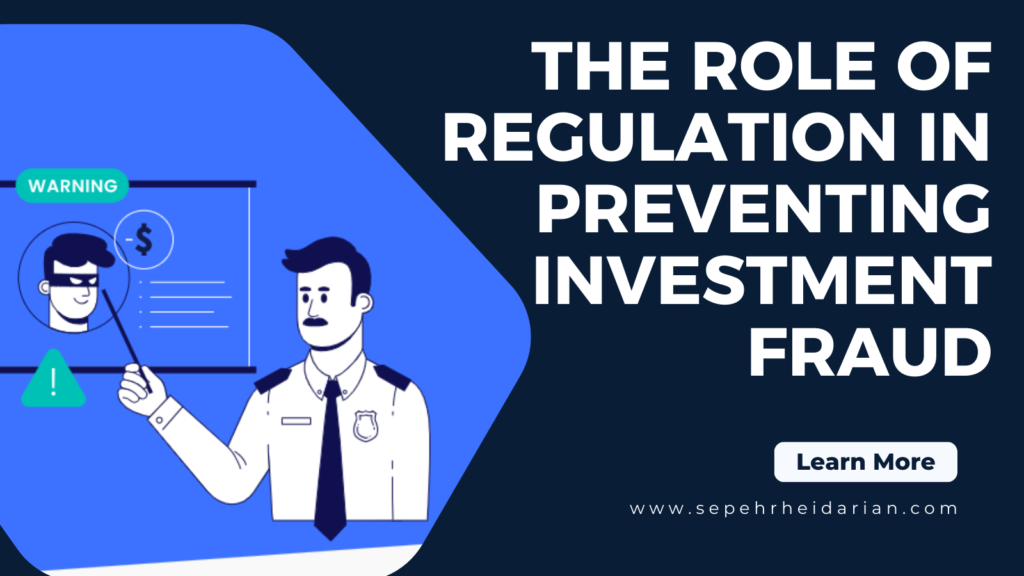Introduction
Investment fraud has plagued financial markets for centuries, deceiving unsuspecting investors and causing significant financial losses. To combat this menace and ensure the integrity of financial markets, regulatory bodies around the world play a crucial role in preventing and deterring investment fraud. This article delves into the multifaceted role of regulation in safeguarding investors from fraudulent schemes and maintaining the trust and transparency necessary for a healthy financial ecosystem.
- Understanding Investment Fraud
Before delving into the role of regulation, it’s essential to understand what investment fraud entails. Investment fraud encompasses a wide range of deceptive activities where individuals or entities misrepresent financial opportunities to attract funds from unsuspecting investors. These activities can take various forms, including Ponzi schemes, pyramid schemes, pump and dump scams, and fraudulent initial coin offerings (ICOs), to name a few.
- The Importance of Investor Protection
Investor protection is paramount for the stability and credibility of financial markets. Without proper safeguards, investors might lose confidence, leading to reduced market participation and hampering economic growth. Regulatory bodies recognize this crucial need and are tasked with creating an environment that promotes transparency, fairness, and accountability.
- The Role of Regulatory Bodies
A. Enforcement and Investigation: Regulatory bodies, such as the Securities and Exchange Commission (SEC) in the United States and the Financial Conduct Authority (FCA) in the United Kingdom, have the authority to investigate and enforce rules and regulations related to investment activities. They conduct thorough investigations into suspicious activities, ensuring that fraudsters are brought to justice and victims are compensated when possible.
B. Licensing and Registration: Regulatory bodies often require investment professionals and entities to be licensed or registered, depending on their roles and activities. These licenses and registrations serve as a means of verifying the legitimacy of investment firms and professionals, making it more difficult for fraudulent entities to operate.
C. Disclosure and Reporting Requirements: To promote transparency, regulatory bodies mandate that investment products and opportunities be accurately and comprehensively disclosed to potential investors. This ensures that investors have access to the information they need to make informed decisions, reducing the likelihood of falling prey to fraudulent schemes.
- Regulation in Action: Case Studies
A. Bernie Madoff Ponzi Scheme: The Bernie Madoff scandal is a stark example of the devastating impact of investment fraud. Madoff’s elaborate Ponzi scheme defrauded investors of billions of dollars. The case highlighted the importance of effective regulatory oversight, as the SEC’s failure to uncover the scheme led to widespread losses.
B. OneCoin Cryptocurrency Scam: The OneCoin scam, one of the largest cryptocurrency-related frauds, underscores the need for robust regulation in emerging markets. Regulatory bodies like the SEC and FCA are taking steps to educate investors about the risks associated with unregulated cryptocurrencies and to crack down on fraudulent ICOs.
C. Vincifx Ponzi Scheme: The Vincifx case sheds light on the role of regulation in detecting and preventing investment fraud. Regulatory bodies’ involvement can expose fraudulent operations and bring perpetrators to justice, protecting investors from significant financial losses.
- Challenges and Future Directions
A. Globalization and Jurisdiction: Investment fraud is no longer confined to national boundaries, making it challenging for regulatory bodies to enforce rules across jurisdictions. Collaborative efforts between international regulatory bodies are necessary to tackle cross-border fraud effectively.
B. Technological Advancements: The digital age has introduced new opportunities for investment fraud, such as online scams and social media-driven pump and dump schemes. Regulators must stay abreast of technological advancements and adapt their strategies to address these emerging threats.
- Educational Initiatives for Investors
In addition to enforcement, regulatory bodies also emphasize investor education. Educated investors are more likely to recognize and avoid fraudulent schemes. Regulatory bodies often provide resources, guidelines, and warnings to help investors identify red flags and make informed investment decisions.
Conclusion
Investment fraud remains a persistent threat to financial markets, but the vigilant efforts of regulatory bodies play a pivotal role in preventing and mitigating its impact. Through enforcement, investigation, licensing, disclosure requirements, and educational initiatives, regulatory bodies foster an environment where transparency, integrity, and accountability thrive. As the financial landscape continues to evolve, regulators must adapt to new challenges posed by technology and globalization to safeguard investors and maintain the vitality of the global financial ecosystem.
